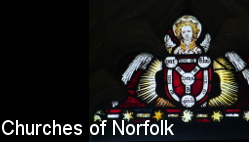| |
|
St Peter
and St Paul, Shropham
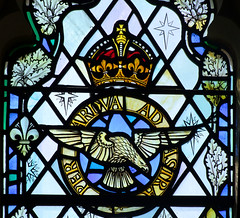 |
|
Shropham is a largish
village on the edge of the Breckland, not far
from the Gallows HIll interchange on the A11, but
with the water meadows of the young River Thet
keeping the modern world at arms length. The
parish was a large one for the Brecklands in
medieval times. Shropham Hall is a good mile off,
as close to Great Hockham as it is to its own
village. And Shropham's church of St Peter and St
Paul is big too, an imposing and substantial
structure, its tower from the early 16th Century
and its nave substantially of the late 15th
Century, but still bearing the marks of the Early
English church it replaced. The north doorway
probably says something of the scale of the
earlier building, as does the pretty clerestory
of quatrefoils. Now,
they are overwhelmed by the huge Perpendicular
chancel, which screams late medieval wealth at
you. Just on its own it would be bigger than many
Norfolk churches. In fact, it was substantially
redone in the 19th Century, but probably as an
accurate copy of what was there before if the
scale is anything to go by, and as for that
magnificent east window, if it isn't the same as
before then I'm sure we won't mind. The
churchyard is also suitably large, with a modern
extension to the west, and pleasingly
disorganised. Here the Shropham dead lie, down
the long generations.
|
Inevitably,
with such a large chancel and low clerestory, the eye is
drawn to the great east window on entry. All this was
intended. By the 15th Century there was a move away from
the shadowy, mystical worship and private devotions of
the previous centuries. The Priest came down out of the
chancel to his pulpit, and made the nave his own. Benches
were provided to encourage a more corporate attitude to
Mass, an enforcement of Catholic doctrine, the beginning
of congregational worship. The building filled with light
from the east, cool, clear and rational. The Reformation
was less than a century away.
Quite the
most eyecatching things about St Peter and St Paul,
however, both date from the 20th Century. They are both
windows. The most interesting is that on the south side
of the chancel by Mary Lowndes. She was one of the major
figures of the Arts and Crafts Movement, working with
such greats as Christopher Whall and creating the Glass
House Studio in Fulham with Alfred Drury, but she was
also an important figure in the Suffragette movement. It
was Mary Lowndes who designed their well-known posters,
including the ones letting the public know about the Cat
& Mouse Act. Her work can be found in half a dozen
East Anglian churches, most notably at Lamarsh in Essex
and Ufford in Cambridgeshire, where she designed full
schemes, but also at Snape in Suffolk, Linton in
Cambridgeshire and here at Shropham, her only work in
Norfolk and an early work at that. It depicts the
Adoration of the Shepherds and the Magi in an English
woodland, a fiery angel standing behind the Holy Family.
At the bottom are scenes of the shepherds in the hills
with their flocks and the wise men following the star.
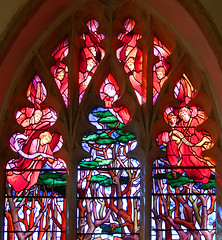 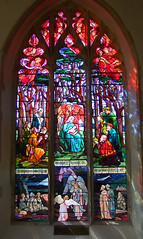 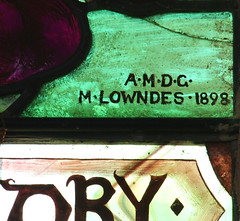
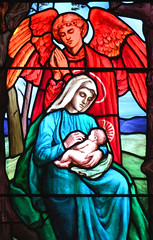 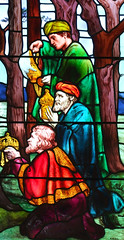 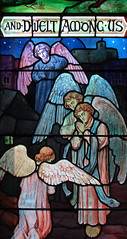 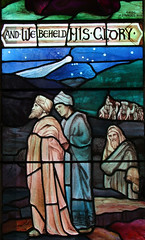
The other
window, perhaps not quite so thrilling, is by Powell
& Sons and dates from the 1940s. It commemorates Flight
Sergeant Ronald Garnier, of Shropham Hall, who was Killed
in action off Gibraltar in a Spitfire 11th October 1942.
The figures of St Michael and St George flank Ronald
Garnier as he kneels to pray with his sword against a
cross, as well as scenes of the Rock of Gibraltar and
Shropham Hall, his home. The only other stained glass in
the church is a curiously unsatisfactory mid-19th Century
crucifixion in the central light of that great east
window. Were there once scenes in the other lights?
| Hanging
on the south side of the sanctuary is one of
those fascinating little survivals which help
make exploring churches so interesting. This is
the late 19th Century processional banner for
Shropham & Larling Girls Friendly Society,
which was an Anglican organisation, one of
several founded at that time of which the Mothers
Union is probably the best known today. The GFS
was intended to support unmarried girls in
service, away from home and working in big houses
like Shropham Hall. It was very common for
working class girls to go into service - my
grandmother, the daughter of a Cambridge drayman,
was a servant in a large house in Hertfordshire
as a young girl in the last years of the First
World War. But it was that War which changed the
social structure of England forever, and although
some girls would still go into service there were
no longer the great numbers of them living away
from home, nor was there any longer the
paternalistic expectation that the Church would
take care of their moral welfare, and it faded
from sight. In fact, the Girls Friendly Society
survives today, working with young women with
emotional difficulties. Nearby, the
great 18th Century wall memorial to James Barker
and his family suggests that they were themselves
probably not short of a few servants.
|
|
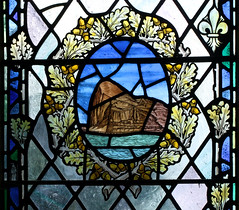 |
|
|
|
